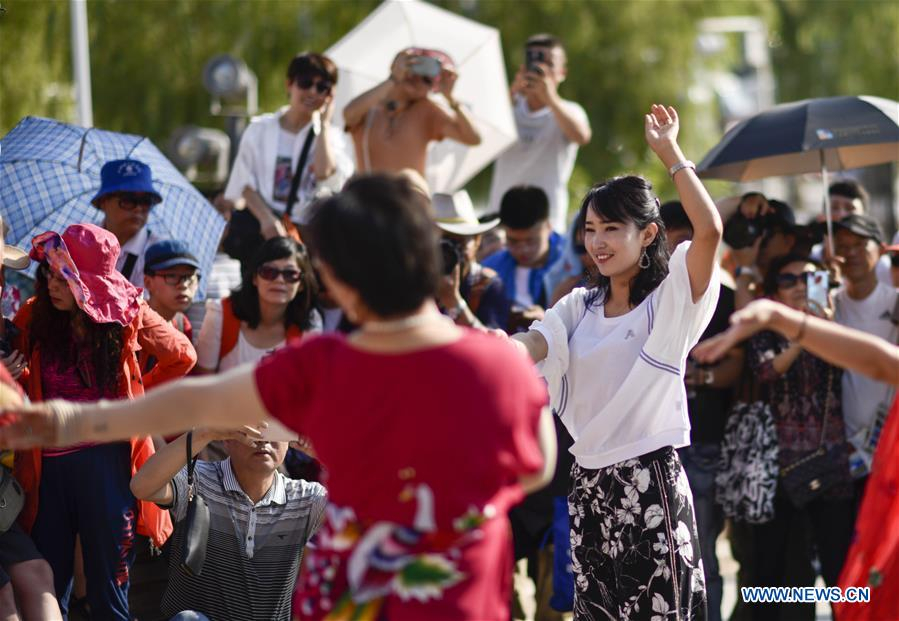
Editor's note: Tom Fowdy is a British political and international relations analyst and a graduate of Durham and Oxford universities. He writes on topics pertaining to China, the DPRK, Britain, and the U.S. The article reflects the author's opinions and not necessarily the views of CGTN.
On Friday morning officials from the Information Office of China's Xinjiang Uygur Autonomous Region held a press conference in Urumqi, capital of the autonomous region, taking questions from journalists on events pertaining to the area. Xinjiang, home to one of the country's officially recognized minority groups, the Uygurs, has been subject to persistent Western criticism in how the government has sought to approach the Islamic group. This has led to angry responses online, as well as a proliferation of false information and unrest among some Muslim communities in the world.
Western sources have repeatedly claimed that Beijing's goal is to eradicate the group or "remove Islam" from the country, making inflammatory claims and associations with historical events in 20th century Western Europe. The conference aimed to address some of these common conceptions directly. Undoubtedly, Xinjiang is going to remain a sensitive subject. Some actors in the West, such as U.S. Secretary of State Mike Pompeo, see opportunity in weaponizing the region to American geopolitical gain.
In light of this conference's questions and answers, there are some important things to note: China is not acting to eradicate or remove one of its official ethnic minority groups or religious identities. Instead, Beijing's actions should be interpreted more carefully. People may continue to have their own respective views, but rather than making highly charged claims, it is absolutely crucial one assesses the country's historically inset apprehension towards religious radicalism and how this has developed into a move to accommodate Islam within the boundaries of the country's legal system and identity.

Tourists and local residents dance in the old town of Kashgar, northwest China's Xinjiang Uygur Autonomous Region, July 11, 2018. /Xinhua Photo
Tourists and local residents dance in the old town of Kashgar, northwest China's Xinjiang Uygur Autonomous Region, July 11, 2018. /Xinhua Photo
China has long-term, historically inset concerns over potential instability risks posed by religion. In the 19th century, the inflow of the West into China saw a growth in Christianity. As defeats at the hands of foreign powers weakened the legitimacy of the Qing Dynasty, the rise of religious fervor is believed to have led to crises such as the Taiping rebellion. Legacies such as this also led Chinese officials to conceive how religious fundamentalism and unrest can threaten the country's national sovereignty.
As a result, the contemporary People's Republic of China, as some believe, has built upon this legacy to articulate a stance that religion is tolerable but must nevertheless be harmonious to society and the law. But supra-national radical ideologies proliferating rapidly in the early 21st century contrast with this principle. This, to some extent, has created the potential for instability within the country, particularly in Xinjiang.
Events in Xinjiang might be interpreted as an effort to harmonize the Uygur identity and group with the broader belonging of China via deradicalization. This is to prevent inter-ethnic conflict and instability. Whilst it is likely the West will continue to disapprove of this, this brings about the important clarifications that China is not trying to destroy or "remove" the group, or turn them into "Han."
The Uygurs remain an officially designated ethnic minority of China which is championed and persistently eluded to on the highest cultural level. One may note that the Chinese Remninbi banknote has Uygur Arabic script text on it, one may note how national museums herald Uygur clothing and cultural icons, and how festivals such as the recent parade in Tian'anmen display iconography. Does this sound like an ethnic group that China no longer wants to exist?
From this, to compare events in Xinjiang to historical memories of Europe is not appropriate as a framework of analysis, nor is accurate to try and say China aims to remove an entire ethnic group or their faith. It is ideological and emotional, and in the case of American diplomacy: opportunistic.
Instead, regardless of one's perspective, Xinjiang events must be assessed through China's longstanding historical apprehension towards religious radicalism and its contemporary perspective that all religions must operate within the boundaries of law and in harmony with the identity of the state, a notion driven by a longing for stability. Events in the autonomous region certainly did not emerge out of a vacuum or "evil intent," but it is a longstanding product of ethno-sectarian conflict that has been costly.
But the bigger question is, will it dispel the myths?
(If you want to contribute and have specific expertise, please contact us at opinions@cgtn.com.)